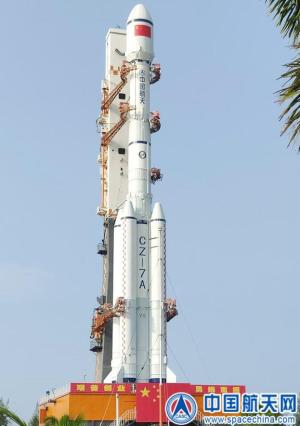You are here
- Home
- blog_categories
- Inclusive Innovation and Development
- The growing role of China in Africa’s space sector
The growing role of China in Africa’s space sector
27 October 2022

On the 13th of September, China’s state-owned enterprise, the China Aerospace Science and Technology Corporation, launched the Long March 7A rocket from the Wenchang spaceport on Hainan Island. The rocket transferred the Zhongxing-1E(ChinaSat-1E) satellite into geostationary transfer orbit, making it China’s 38th orbital launch in 2022.
The launch of Zhongxing-1E using the Long March 7A rocket was hailed as a success after a dismal and failed attempt in March 2020. The Long March 7A rocket has been celebrated as a breakthrough as it is capable of launching up to 7 metric tons, a heavier load and can be launched from a lower latitude, inevitably making it cheaper and safer than the hypergolic Long March 3B.
While China is on a path to becoming a space giant, as observed in the number of launches this year alone, it is also increasingly playing a significant role in Africa’s space sector, as explained below. Meanwhile, between 1998 and 2019, Africa launched about 37 satellites, 17 of which were since 2015. Recent data from Space in Africa shows that the African space economy is worth more than US$19 billion and is projected to grow by more than 16% by 2026. This means, Africa is seen as a new market frontier for financing and developing space infrastructure by international contractors, notably those from China.
Space infrastructure and its utilisation for sustainable development
Investment in space infrastructure, if properly managed, has the potential to critically contribute to poverty reduction (SDG1), increased and enhanced agricultural productivity (SDG2), enhanced inclusive and equitable education and learning opportunities (SDG4), the building of resilient infrastructure necessary for industrialisation and fostering of innovation (SDG9), and employment creation and economic growth (SDG8) among others. Yet most African countries lack the financial and technical skills to develop this industry. The continent has also not harnessed opportunities for a continental space network as a shared capability.
Over the past decade, Chinese enterprises have shown interest in financing and developing African public and private sector space programs. A recent report from the Space in Africa estimates that Chinese companies and financial institutions play a critical role in developing the space industry in Egypt, Ethiopia, Tunisia, Algeria, Namibia, Sudan, DRC, Kenya, Mozambique, Rwanda, South Africa and Nigeria among others. For example, the China Great Wall Industry Corporation (CGWIC) and China HEAD Aerospace Technology Company were involved in the launching of Ethiopia’s first micro-satellite, the Ethiopian Space Science and Technology-1 (ESST-1) in 2019, and the ET-SMART-RSS in 2020. Similarly, CGWIC has partnered with the Nigerian National Space Research and Development Agency (NASRDA) to finance, design and launch NigComSat-1, NigComSat-1R, NigComSat 2 and 3.
Rising risks or proliferation of opportunities?
The increasing commitment by Chinese enterprises to finance and develop African countries' space industry has generated many speculations. For one, ideological and geopolitical driven analysis, particular those coming from western Europe and north America, are geared towards understanding the benefits of Chinese companies’ involvement in Africa’s space sector and how that threatens their interests. That said, is China’s involvement good or bad for Africa’s space sector and in what ways?
Our preliminary assessment of this evolving partnership seems to suggest that China’s involvement in Africa’s space infrastructure finance and development cannot simply be reduced to the question of what China benefit from this modality of engagement. This is because China’s interests in Africa’s space industry are entangled with those of African political, economic, and social actors.
On the one hand, the Chinese companies involved in the space sector see a market opportunity. Resultantly, analysts suspect that China’s motivations for developing Africa’s space industry are to construct remote sensing satellite networks and corridors of influence and control that would allow China to support its logistical integration of the Belt and Road Initiative in the partner states. Linked to this, others purport that Chinese-driven space technology and related applications are potentially appealing to authoritarian regimes as they can be used for surveillance and repression of their people, thereby reversing democracy and good governance achievements recorded in the past decades.
On the other hand, Africans consider doing business with the Chinese strategic, particularly given how Chinese financing and project implementation modalities are seen to be more attuned to African countries’ development needs and realities. As such, some consider that China is helping and collaborating with Africans to develop the capability to deploy space technology for satellite data-informed remote sensing, monitoring and management processes necessary for socio-economic development.
Africa-China cooperation in space sector: the jury is out
The role, motivations and impacts of the Chinese public and private enterprises involved in Africa's space infrastructure is growing, and preliminary evidence based on our assessment appear to suggest that there are opportunities and risks for both African and Chinese stakeholders. However, the development impacts and outcomes of this mode of engagement will largely be influenced and determined by how both African and Chinese actors react to these opportunities. A clear African strategy on the space sector has become an urgent necessity to shape Chinese space investment to local needs.
This blog was written by Dr Frangton Chiyemura, a Lecturer in International Development in the Department of Development Policy and Practice, School of Social Sciences and Global Studies at the Open University, U.K., and Prof Siphamandla Zondi, a Professor in the Department of Politics and International Relations and Acting Director of Institute for Pan-African Thought & Conversation at the University of Johannesburg, South Africa.
Share this page:
Contact us
To find out more about our work, or to discuss a potential project, please contact:
International Development Research Office
Faculty of Arts and Social Sciences
The Open University
Walton Hall
Milton Keynes
MK7 6AA
United Kingdom
T: +44 (0)1908 858502
E: international-development-research@open.ac.uk
.jpg)